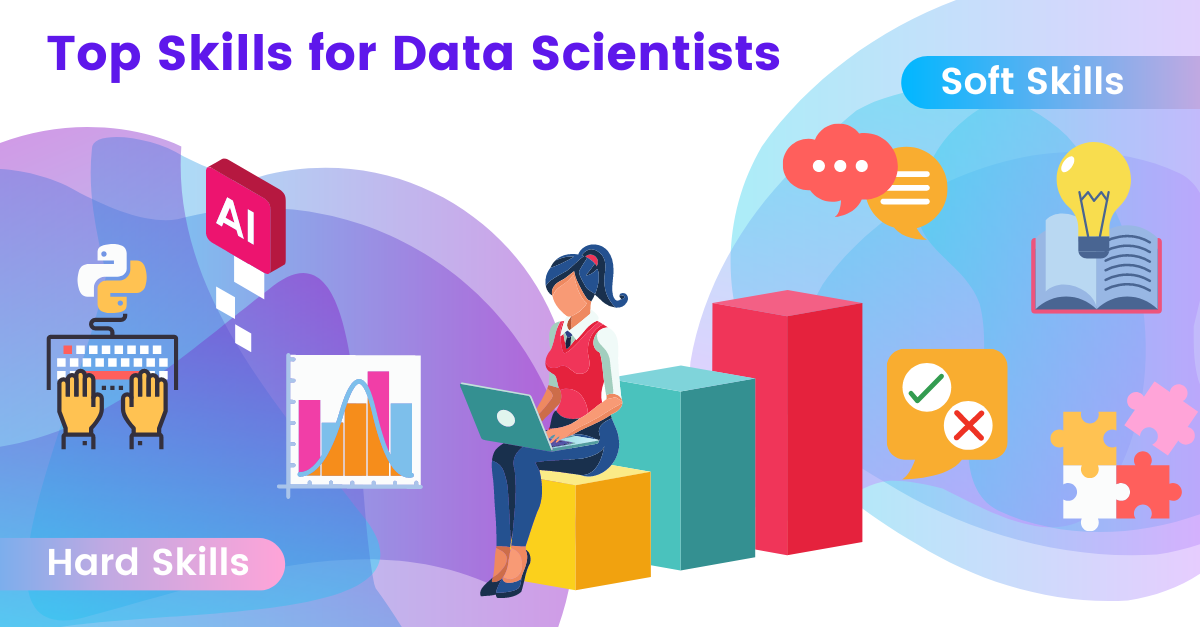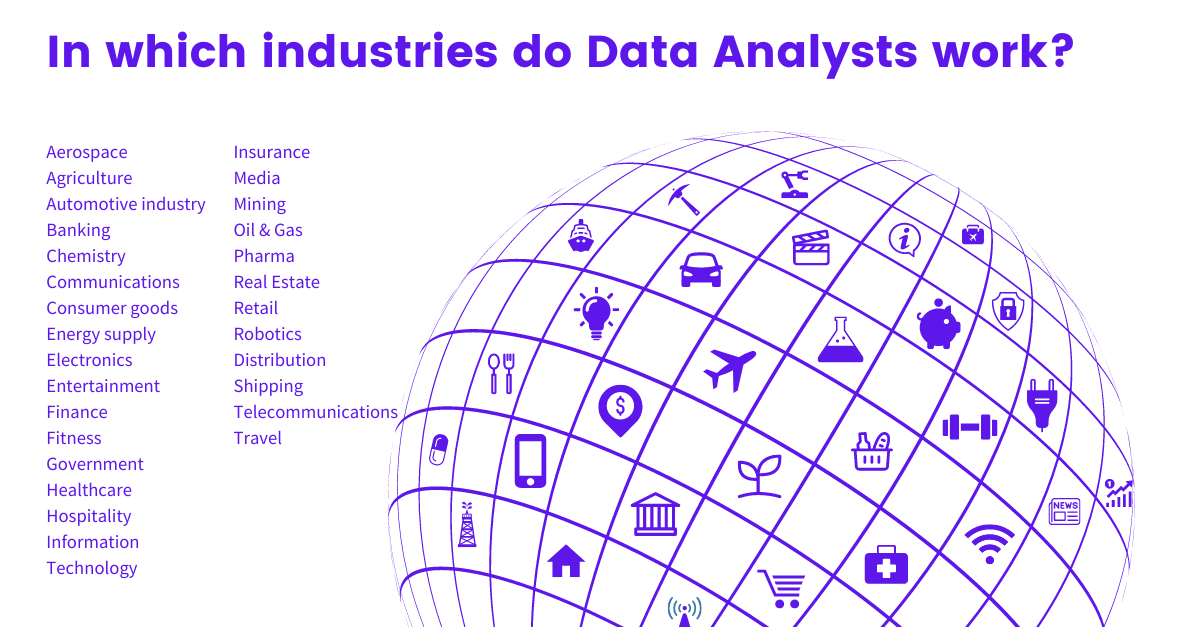The most important questions about salary, tasks, requirements and lateral entry as a data scientist
The sexiest job of the decade is not as new as many believe. The profession of data scientist regularly encounters a wide variety of reactions, yet it has been around since the 1960s. And it has a lot to offer: A high salary, a crisis-proof job, and many open positions due to the acute shortage of skilled workers. All of this makes the job as a data scientist very attractive, even for career changers without any prior technical knowledge. Education voucher you can even get further training free of charge under certain conditions.
But what exactly is a data scientist? In their day-to-day work, a data scientist analyzes large amounts of data, searches for relationships between the data and uses this as a basis to derive predictions for developments and trends. Many companies already collect data, but this only has value if it can be analyzed in a useful way. From this amount of data and Big Data thus becomes a decision support tool, also called "Smart Data".
To make this happen, a Data Scientist uses advanced analytical methods to predict trends with the highest possible reliability. This method is also called predictive analytics and helps a company arrive at the best possible decision in order to have a competitive advantage over the competition.
Data Scientists are in demand
Data experts like the Data Scientist are currently in greater demand than ever on the job market. In addition to their core competence in dealing with data, they usually also need to have other technical skills such as the Python programming to make them valuable for many companies. Many companies are already aware that demand will continue to increase and are countering this with training and continuing education for their workforce.
That is why more and more employees are interested in this future-proof and respected job. Before you start your career as a Data Scientist, you should know what skills a Data Scientist should have, how you can get started and what role mathematics, programming and statistics play in the profession. These questions and more will be explored in this article to help you get started.
What is a data scientist?
Our world is digital and more connected every day. The progress of digitalization is also increasing the amount of data and the importance of actively using it. Accordingly, the need for data experts such as data scientists who can handle this flood of data and turn it into valuable analyses and reports is also growing.
Translated from English, the job title Data Scientist means something like data scientist. Simply explained, data scientists are analytically thinking data experts who use the company's own data sources as well as external data to make predictions and thus identify economic challenges and opportunities for the company at an early stage.
Instead of asking what happened, as a Data Scientist you ask what will happen. Of course, a Data Scientist is not a clairvoyant or just follows his gut feeling. You base your assumptions on real data, which you evaluate with a system and gain knowledge from. First, a hypothesis is created that you want to test. For this, you need a good understanding of the business context.
As a Data Scientist, you identify suitable data sources and collect the relevant data and create a model that you continuously adjust until hypothesis and reality are as close as possible. Often, as a Data Scientist, you have to look for creative solutions on how to improve data quality in order to perform analyses that would otherwise not be possible. The insights gained from a Data Scientist's work are designed to help business leaders make the right business decisions and be strategic in their implementation.
You not only rely on the data available to the company, but also draw on sources such as social media. As a data scientist, you use scientific approaches and methods from computer science, mathematics and statistics to systematically analyze large amounts of data, some of which is unstructured.
What this looks like in practice on a day-to-day basis depends largely on the area in which a Data Scientist works, business or science, and can vary from industry to industry and company to company. A Data Scientist may work on customer buying behavior, self-driving cars, or automation in finance, and each project brings its own challenges.
As a Data Scientist, you have a great responsibility, because a lot depends on the results of your analyses for companies and customers. Analyses in the medical field or training artificial intelligence for self-driving cars have a major impact on individuals and society. That's what makes the job of a Data Scientist so versatile and fulfilling.
How is it different from being a Data Analyst?
In contrast to the Data Analystwho is more responsible for a classical data analysis, the Data Scientist has a stronger scientific focus. Although it is not possible to distinguish between the two professions precisely because many of their activities overlap, it can be generally assumed that the tasks of the Data Scientist require more advanced, scientific analysis and prediction methods.
For this reason, Data Scientists usually have an academic background and come from disciplines such as mathematics, physics or computer science. From there, they bring with them important skills for the profession of Data Scientist, such as statistics, analytical methods or probability calculation, which are absolutely necessary for machine learning and artificial intelligence applications.
A solid knowledge of mathematics and statistics are the cornerstones of the Data Scientist's work. It is particularly important that he or she not only analyzes data in the privacy of his or her own home, but can also communicate it verbally to others. Good communication skills characterize the Data Scientist and make him a valuable advisor to company management.
Your tasks as a Data Scientist
Now that we've clarified what a Data Scientist is and why the profession is in such high demand, we'll move on to what exactly Data Scientists do, what your role in the company is, and what areas of responsibility you'll have as a Data Scientist.
1 Formulate question
Before you can start your analysis, you have to define what you want to find out. The result of your analysis is only as good as the question on which the analysis is based. This makes this step the most important in the whole analysis process. Even a house is only as stable as the foundation on which it is built. In order to define the right question, you must determine the goal of the analysis.
Sometimes you will feel like Sherlock Holmes, because quite often the obvious problem is not the one that leads to the core of the solution. So you will first have to look at the problem you want to solve from different perspectives to get an overall picture. Possibly, with enough experience, you will even start looking for optimization opportunities in the company on your own and identify exciting use cases.
2 Collect and clean data
Now comes the step in which you gather the appropriate data to answer your question. To do this, you first identify the right data sources:
- First-party data collected directly from you or your company
- Second-party data coming from another company
- Third-party data that comes from external sources such as social media
To collect second- and third-party data, you need to come up with a good strategy and use data from surveys, observations from social media posts, or online tracking of a website. In some cases, it may even be necessary to develop your own models and algorithms for data mining. Once you have collected enough data, it will need to be cleaned, as it will be in both structured and unstructured form. By cleaning and validating the data, you can ensure its accuracy, completeness, and consistency.
3 Analyze data
A special skill of Data Scientists is exploratory analysis. In exploratory data analysis, you set aside your initial assumptions, hypotheses or data models and instead try to make the underlying structure of the data visible. This allows you to identify important variables and spot outliers and anomalies. The subsequent data processing phase involves entering the data into a system. This can be a CRM like Salesforce or a data warehouse.
4 Model data
Data modeling depicts how data flows through a software application or an organization's data architecture. You can think of it as a blueprint that shows how data is collected and stored. When you model data, you act like a civil engineer overcoming unexpected hurdles and trying to fix pieces until everything fits together. You'll find the most efficient way to store information while providing complete access and reporting.
5 Documentation, visualization and presentation
A Data Scientist is expected to document your processes and provide enough descriptive information to help you in your own work, but also to help colleagues and other data scientists in the future. Not everyone can read and understand statistics. Visualization is therefore one of the most important skills to ensure that the collected findings are understood by key business functions and that they can act upon them.

Become a data scientist: These are the skills you need
By now you're probably asking yourself: "How do I become a data scientist?" Data scientists need a wide range of skills as a foundation, from technical knowledge of programming languages and statistical software to communication and storytelling. There is no doubt that the exact skills required of a data scientist depend on the client, field of work and career level. To make a data scientist lateral move and help companies make smarter decisions and develop better products, data scientists need two types of skill sets:
Technical skills
As a Data Scientist, you should have a solid understanding of mathematics and statistics, as you will very often need statistical models to analyze data. In addition to knowing how to collect, clean, and manipulate data, Data Scientists need to be comfortable with statistical modeling software, such as SQL databases and the Hadoop platform.
In addition, programming skills are a great advantage, because you can extend modeling functions independently and are independent of rigid software solutions. Furthermore, Python and R are considered the must-have programming languages in the field of Data Science.
Programming: Python, SQL, Scala, Java, R, MATLAB
A Data Scientist needs to understand programming languages on the one hand, but also be able to manage databases. Programming is your means to process and analyze data.
Machine Learning: Natural Language Processing, Classification, Clustering, Deep Learning
A Data Scientist uses the intelligent processes of Machine Learning to automate decision-making, previously done by humans, through computers. A computer does not initially know which decision is the right one, so a Data Scientist must continually train that computer until the computer's predictions are accurate enough.
Data Visualization: Tableau, SAS, D3.js, Python, Java, R
A Data Scientist also needs to translate their findings into images to present and communicate to others without their expertise.
Big Data: MongoDB, Oracle, Microsoft Azure, Cloudera
A Data Scientist uses both structured and unstructured data. It is not uncommon for data analysis to involve Big Data-techniques are used.
Soft Skills
A Data Scientist must be able to do more than simply control the right tools, he uses them to analyze data in different ways. To do this, he uses his knowledge of statistics, probability calculation or A/B tests. This requires not only a lot of creativity, but also a solution-oriented approach. Often, Data Scientists have to design new databases or develop new algorithms. Last but not least, a Data Scientist must be able to communicate very well, not only with their own team, but also with management or customers. The job therefore requires not only hard skills, but also very specific soft skills.
Communication: Effective communication is the most important non-technical skill you need as a Data Scientist. As a storyteller, you know how to visualize data and communicate its results to key stakeholders who may not have a technical background.
Critical Thinking: Critical thinking is a very valuable skill in any profession, but especially for data science. It helps you as a data scientist to find insights, to formulate questions accurately and to understand how the result of the data analysis benefits a company and which next measures have to be initiated.
Analytical Skills: This skill helps Data Scientist search for answers and challenge initial assumptions. Data Scientists are always asking "why" and following their urge to uncover new questions, especially those that have never been asked before. As a Data Scientist, you will use your sleuthing skills to uncover underlying truths and go on the hunt for answers.
Problem Solving Ability: In your day-to-day work as a Data Scienstist, you'll need to identify opportunities and find solutions to all sorts of problems by challenging existing assumptions, identifying resources, and putting on your detective hat to find the fastest path to a solution. The ability and desire to solve problems is at the core of data science.
Lifelong Learning: Data Scientists see themselves as a "work in progress". They understand that no one can know everything, and since data science is always evolving at a rapid pace, even experienced Data Scientists must always keep up with developments to stay ahead of the curve. A new problem, can often lead to new research. This natural curiosity drives you as a Data Scientist.

How do I become a data scientist? Requirements for lateral entry in data science
Believe it or not, even career changers can become Data Scientists with the right training. Data Scientists are usually more highly qualified than Data Analysts. According to KDnuggets 88 percent of Data Scientists have at least a master's degree and 46 percent have a doctorate.
It may sound like a science career is a basic requirement for a career as a Data Scientist. While this is very helpful, it is not absolutely necessary for this career path. Because even if STEM subjects provide important prerequisites, there are definitely also career changers in the field of data analysis and data science.
In fact, it can be an advantage to have already gained experience in other specialist departments in order to support them successfully in turn. Someone who knows the processes, workflows and ways of working of departments also recognizes hidden potential for optimization, data collection and solution finding. A Data Scientist must have a technical understanding of a department in order to be able to advise it well. Probably the most important prerequisite is therefore your curiosity and willingness to learn.
What does a typical day look like for Data Scientists?
Again, there is no such thing as a typical day for a Data Scientist. Nevertheless, to illustrate the daily routine, let's choose the example of a Data Scientist in the field of personalized advertising. Let's call him Paul.
His day starts with checking whether there is new data in the data warehouse that he needs for a project. The data is personal, which is why Paul first has to have it anonymized. Before Paul can continue, he must first check that all the data is complete and that the coding of the text variables is correct. He finds an error in the data from the last two weeks and brings this bug, a technical error, to the attention of a data engineer on the team. He enters the data Paul already has into a model and tries out different approaches to analyzing it.
In the afternoon, Paul gets creative and tests what performance he can get out of the data. He discusses his ideas with his colleagues and Googles possible approaches and consults specialist literature. In the following days, the data engineer will come to Paul with the missing data, which he will then transfer into a larger model along with the existing data, where it will be applied to personalized advertising. Paul will then visually prepare and present the results of his analysis and recommended actions to other departments.
What does a Data Scientist earn and what are the career opportunities?
Since the job is in high demand right now, the compensation can be quite high. As a career starter, you start according to the trade site Get in IT with an average annual gross salary of 45,000 euros. What you will receive at the end of your data career depends, as in any career, on various factors such as industry, the size of your employer and your position in the company. There are, of course, no rigid salary limits, but the maximum salary is usually between 99,800 and 108,200 euros per year, depending on professional experience and personnel responsibility.
As a Data Scientist, you can work wherever large amounts of data are collected and there is an interest in learning from this data and optimizing processes:
- Logistics - Here, routes and schedules must be optimized to find the fastest routes.
- Online trade - There, it is necessary to find out how returns can be reduced by directly suggesting the right product to customers.
- Energy supply - If consumption peaks and bottlenecks can be predicted, the supply can be adjusted accordingly.

There are countless specializations for Data Scientists. This is particularly interesting for career changers who already bring previous knowledge in a specialist area to this profession. This prior knowledge is very valuable because it helps to identify the right questions for analyses and to draw the right conclusions.
Data Scientist lateral entry: how it works
A recently published McKinsey study could show that more than 100 million employees will have to look for new employment by 2030. Many jobs will gradually disappear due to the digital transformation, but fortunately many new jobs will also be created.
LinkedIn expects 150 million jobs to be created in IT or IT-related fields over the next five years. These jobs are particularly important for the sustainable and long-term success of companies and should therefore be the focus of job changers.
The demand for Data Scientist is already very high today. Aspiring Data Scientists and career changers get a foot in the door by starting as Data Analysts and moving on from there to gain experience. If you are not sure whether the job description of a Data Scientist suits you, you should choose an entry-level course in Data Awareness or Data Driven Management and specialize step by step.
Find out about a Further training to become a Data Scientist and your possibilities a Education voucher to apply.
Did you find this article interesting? Then you might also be interested in the article about the job as a data analyst: To the article
Sources:
LinkedIn (2021): "LinkedIn Jobs on the Rise: 15 opportunities that are in demand and hiring now" [11.03.2021]
McKinsey Global Institute (2021): "The future of work after COVID-19" [11.03.2021]
Master's in Data Science (2020): "What is a Data Scientist" [11.03.2021]
Get in IT: "What does a Data Scientist do?" [09.06.2021]





